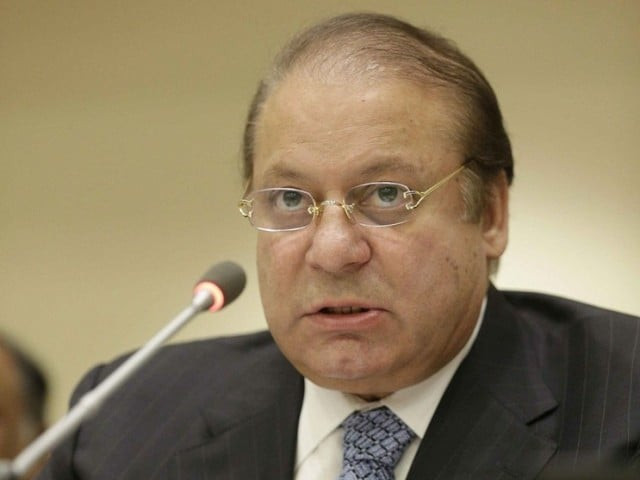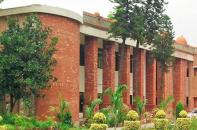National Action Plan: Sindh, Balochistan lag behind in implementation
We have to implement this agenda no matter what: PM

We have to implement this agenda no matter what: PM. PHOTO: REUTERS
Sindh and Balochistan governments have hardly taken any steps to implement the new counter-terrorism plan, sources said on Wednesday as Prime Minister Nawaz Sharif cautioned that “there is no margin of error” in the fight against terrorism and extremism.
The National Action Plan (NAP), dubbed a paradigm shift in the country’s fight against a deadly Taliban militancy, was adopted through a national consensus following the massacre of 150 people, mostly students, by Taliban terrorists at the Army Public School in Peshawar on December 16.
A high-level huddle was informed on Wednesday that the provincial governments of Sindh and Balochistan have not convened their respective apex committees, sources told The Express Tribune. The provincial apex committees were formed earlier this month to oversee NAP’s implementation.

The prime minister chaired the meeting where top civil and military leadership, including army chief General Raheel Sharif, ISI chief Lt Gen Rizwan Akhtar, Interior Minister Chaudhry Nisar Ali Khan, Defence Minister Khawaja Asif as well as all four provincial chief ministers were in attendance.
The chief ministers and their top bureaucrats briefed the prime minister on the progress they have made so far on the implementation of NAP in their respective provinces. They discussed all 20 points of the NAP while the interior minister gave a briefing on their implementation status.

Sindh Chief Minister Syed Qaim Ali Shah said his province lacked funds for counter-terrorism operations. Balochistan Chief Minister Dr Abdul Malik Baloch conceded his government’s failure to implement the NAP and asked for ‘competent officers to combat terrorism’.
Khyber Pakhtunkwa (K-P) Chief Minster Pervez Khattak also complained about non-availability of funds. However, he said his government has so far issued three ordinances and held one meeting of the apex committee to implement the NAP.
The meeting participants appreciated the efforts of Punjab government, which has so far promulgated six ordinances as legislative agenda against terrorism. These ordinances are related to information on temporary residents, tenants at guest houses and hotels, security arrangements for vulnerable places, graffiti, illegal weapons, reforms in loudspeakers/sound systems laws, charity collection law and investigation procedures, regulation of worship places, Madaris and free speech, etc.
The participants were informed that Punjab has strengthened its counter-terrorism department and has also formed a strategic council and a strategic board, respectively headed by the chief minister and the chief secretary.
In every district, army, police and intelligence agencies are carrying out joint operations on a daily basis while a joint intelligence control room – which has representations from military and civilian intelligence agencies – has been set up at the home department.
The meeting was told that Punjab’s apex committee has held seven meetings, one of which was co-chaired by the army chief and the chief minister.
‘No margin of error’
Addressing the meeting participants, Premier Nawaz said the provinces must focus on the implementation of NAP and the Centre would assist them in every possible way, according to a statement issued by the Prime Minister House.
“We have to implement this agenda no matter what, and all provinces have to work hand in hand,” he said, adding that the NAP would be implemented in letter and spirit in close coordination with all provinces for elimination of terrorism.
The agenda was not prepared by the federal government alone but by the political leadership of the country, he added. The premier said his government had taken two steps immediately after the Peshawar massacre, including the 21 constitutional amendment for setting up military courts.
He said implementation of the NAP was the key to eradicating terrorism from the country. “We will do everything to achieve this objective even if this involves special allocation of funds,” he said.
The prime minister said the government’s seriousness should not be doubted. “We are not only going after terrorists but also for those who are facilitating them,” he added. “We have to succeed [in this war] at all costs and there is no margin of error.”
Military court
The military leadership apprised the participants that nine military courts will start functioning in the country within 10 to 15 days. At present, the army has designated officers for these courts, which are involved in preparation of documentations against terrorists. It said the army chief has given surety that only ‘jet-black terrorists’ would be tried in the military courts.
Published in The Express Tribune, January 22nd, 2015.



















COMMENTS
Comments are moderated and generally will be posted if they are on-topic and not abusive.
For more information, please see our Comments FAQ